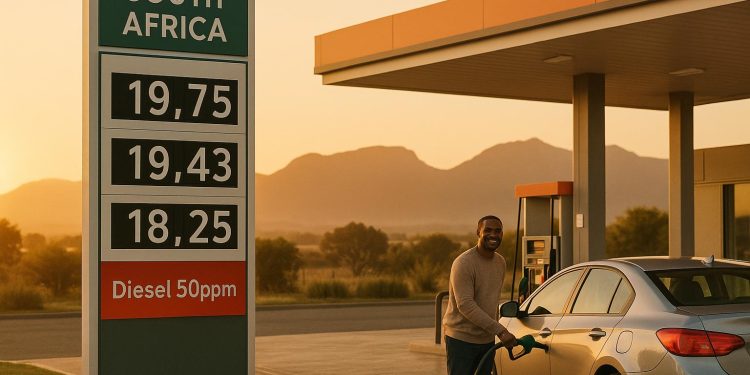South Africans are seeing a welcomed drop in fuel prices starting midnight, November 4, 2025. The government confirmed reductions for petrol, diesel, and paraffin, offering relief to drivers, households, and businesses. Key factors include lower global crude oil prices and a stronger South African rand.
Key Price Reductions:
- Petrol 93: Down by 63 cents per liter
- Petrol 95: Down by 59 cents per liter
- Diesel 0.05%: Down by 35 cents per liter
- Diesel 0.005%: Down by 34 cents per liter
- Illuminating Paraffin: Down by 16 cents per liter
These changes are tied to Brent crude oil prices dropping below $62 per barrel and currency gains against the US dollar. While this offers immediate savings on travel and transport, experts caution future price shifts depend on global markets and exchange rates.
Petrol prices to drop from midnight
November 2025 Fuel Price Changes
The government has announced adjustments that will lower fuel costs across key categories, aiming to bring immediate relief to consumers at gas stations nationwide.
New Prices for Petrol, Diesel, and Paraffin
The Department of Mineral Resources and Energy has confirmed fuel price reductions for November 2025. While specific retail prices weren’t disclosed, the adjustments cover petrol, diesel, and paraffin. The exact cost will vary depending on the province and individual fuel station operators. This change is expected to ease financial pressure on vehicle owners, transport operators, and households alike.
When New Prices Start
The new prices took effect at midnight on Tuesday, November 4, 2025. Gas stations across the country updated their rates immediately after the announcement, which was made in late October 2025.
However, experts caution that these price cuts might not last long. Factors like global crude oil prices, exchange rate fluctuations, and domestic policies could influence future adjustments.
Why Fuel Prices Dropped
South Africa’s recent fuel price reduction can be traced back to a drop in Brent crude oil prices, which fell from approximately $67 to below $62 per barrel. Since the country depends heavily on imported crude oil, this decrease in global prices had a direct impact on local fuel costs. Another contributing factor was the calming of geopolitical tensions, such as the recent ceasefire in Gaza, which helped stabilize markets and eased concerns about potential supply disruptions.
sbb-itb-09752ea
How Lower Fuel Prices Affect South Africans
The recent announcement of reduced fuel prices brings welcome relief to South Africans, cutting transportation costs for individuals and businesses alike. Here’s a closer look at how these changes translate into savings and economic benefits.
Savings on Vehicle Fuel Costs
Lower fuel prices mean drivers can save a significant amount over time. Whether for personal vehicles or business fleets, the cost of regular refueling becomes noticeably lighter on the wallet. This is especially meaningful for daily commuters and small business owners who rely heavily on transportation.
Reduced Daily Travel Expenses
For those who depend on public transport or ride-hailing services, lower fuel prices can lead to cheaper fares. Taxi operators and ride-hailing companies often adjust their rates in response to fuel price changes, which directly benefits passengers by easing the burden of daily travel costs.
Broader Economic Impacts
The ripple effects of lower fuel costs extend beyond individual savings. Businesses in logistics and manufacturing, for instance, can enjoy reduced operating expenses, which may help stabilize consumer prices. Additionally, small businesses might find themselves with extra financial breathing room, enabling them to invest in growth opportunities. Together, these factors contribute to a more resilient and dynamic economy.
November 2025 vs Previous Months’ Fuel Prices
From September to November 2025, fuel prices steadily declined, offering some much-needed relief for South African drivers. This downward trend was a welcome change, especially given the financial pressures many households face.
September to November 2025 Price Changes
During these three months, official data revealed a consistent drop in key fuel prices. For instance, 95-octane petrol saw a monthly decrease, reaching significantly lower levels by November. Diesel and paraffin prices followed a similar pattern, easing costs for both motorists and households alike.
A stronger South African rand against the US dollar played a key role in this trend, as it reduced the cost of imports. These gradual reductions provide a clearer picture of the economic shifts during this period.
What These Trends Mean
For commuters and fleet operators, the lower fuel prices offered a tangible benefit by cutting daily transportation expenses. This provided some breathing room for budgeting, especially in a time of rising living costs.
Summary: November Fuel Price Update
Main Points Recap
South African fuel prices saw a reduction in November 2025, as confirmed by the government. This decrease was attributed to two key factors: a drop in Brent crude oil prices and a stronger Rand.
Between September 26 and October 30, 2025, Brent crude prices fell from $67.16 to $64.14 per barrel. At the same time, the Rand gained strength, moving from R17.49 to R17.29 against the US dollar. These combined factors contributed to lower costs for petrol, diesel, and paraffin across the country. Recognizing these economic shifts can help drivers make informed decisions about their fuel usage.
Tips for South African Drivers
With fuel prices down, drivers have an opportunity to save even more by fine-tuning their driving habits. Adopting fuel-efficient techniques – like easing off the accelerator – can stretch your fuel further. These adjustments are especially useful in the days leading up to November 4, 2025, when the reduced prices officially take effect.
FAQs
How will the recent drop in fuel prices affect the cost of living in South Africa?
The recent drop in fuel prices is bringing some much-needed financial breathing room for South Africans. With transportation costs making up a big chunk of living expenses, lower fuel prices could mean noticeable savings for households. For businesses, especially those in logistics and transportation, this could translate into steadier costs, which might help keep prices for goods and services more manageable.
Fuel prices also play a key role in driving inflation. A decline here could ease some of the financial strain on households, making it a bit easier to cover daily essentials like commuting and groceries. While the degree of relief will differ, both consumers and small businesses stand to benefit from this welcome change.
What could cause fuel prices to rise again after the recent drop?
Fuel prices might climb in the future due to several key factors. One major influence is the global price of crude oil, which can spike because of geopolitical conflicts, supply disruptions, or growing demand. Another critical factor is the exchange rate between the South African Rand and the US Dollar, as fuel imports are priced in dollars, making fluctuations in the exchange rate a direct contributor to price shifts.
Additional elements that could drive up prices include adjustments to government taxes or levies on fuel and changes in global market trends. Being aware of these variables can help you better anticipate and prepare for potential increases in fuel costs.
How does a stronger South African rand affect fuel prices in the country?
A stronger South African rand can play a key role in reducing fuel prices. Since crude oil – the main ingredient in fuel – is traded globally in US dollars, a stronger rand means South Africa spends less on importing oil. This can translate into lower costs at the pump for consumers.
While currency strength is just one of several elements that impact fuel prices, it has a major influence on the monthly price adjustments drivers see.
Related Blog Posts
- Fuel-Saving Tips for Long South African Road Trips
- EV Import Duties in South Africa Explained
- South Africa hits decade-high new vehicle sales – market surges in October
- South Africa new-vehicle sales hit 55 000+ in October 2025 – best month in a decade





